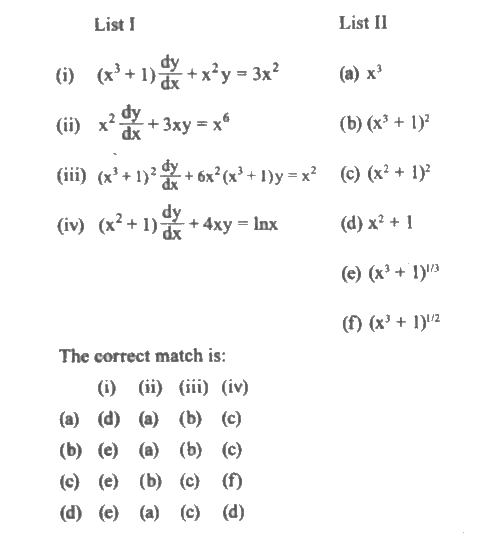x=cos−1(1√1+t2),y=sin−1(t√1+t2)⇒dydx is equal to Solution in Telugu
0
tan t
1
sin t cos t
The correct Answer is:C
Step by step video, text & image solution for x = cos^(-1)((1)/(sqrt(1+t^(2)))),y = sin^(-1)((t)/(sqrt(1+t^(2))))rArr(dy)/(dx) is equal to by Maths experts to help you in doubts & scoring excellent marks in Class 12 exams.
Updated on:21/07/2023Topper's Solved these Questions
Similar Questions

View SolutionMatch the reactants in List - I with the products in List - II
List - I List - II(a)H2O+H2S(i)(H3O+,HS−)(b)H2O+N3−(ii)(NH3,OH−)(c)H2O+SiCI4(iii)(OH−,H3S+)(d)H2O+F2(iv)(SiO2,HCI)(v)(SiO4−4,HCI)(vi)(O2,F−)(vii)(HF,OH−)(viii)(OH−,HN3)
The correct answer is
View Solutionif x=sqrt((1-t^(2))/(1+t^(2))),y=(sqrt(1+t^(2))-sqrt(1-t^(2)))/(sqrt(1+t^(2))+sqrt(1-t^(2))) then (dy)/(dx)
View Solutionयदि ex=√1+t−√1−t√1+t+√1−t व tany2=√1−t1+t,t=12 पर dydx=
View SolutionIf x=sin−1(t√1+t2),y=cos−1(1√1+t2),show that dydx=1
View Solutiondydx ज्ञात कीजिए -
x=sin−1.t√1+t2,y=cos−1.1√1+t2
View SolutionFor t∈(0,1),≤tx=√2sin−1(t)andy=√2cos−1t, then 1+(dydx)2 equals :
View SolutionIf cosx=1√1+t2, and siny=t√1+t2, then dydx =
View Solutionयदि cosx=1√1+t2 और siny=t√1+t2तो सिध्द कीजिए कि dydx=1
View SolutionThe value of dy/dx , when cos x = 1√1+t2 and sin y = t√1+t2 is
View SolutionIf cos x =1/sqrt(1+t^(2)) , and sin y = t/sqrt(1+t^(2)) , then (dy)/(dx) =
View SolutionIf x=cos^-1(1/(sqrt(1+t^2))) , y=sin^-1(1/(sqrt(t^2+1))) then dy/dx is independent of t.
View SolutionIf x=√1−t21+t2,y=√1+t2−√1−t2√1+t2+√1−t2 then dydx =
View SolutionIf y=cos−1(1√1+t2),x=sin−1(√t21+t2),find dydx
View SolutionFor t∈(0,1),Letx=√2sin−1(t)andy=√2cos−1(t) then 1+(dydx)2 equals :
View Solution